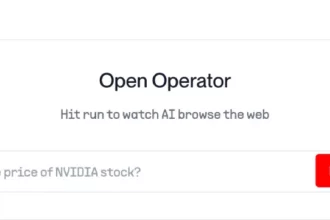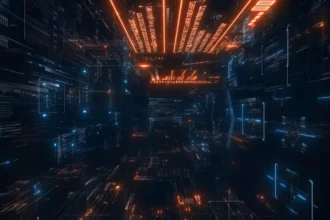Table of Contents
ToggleRunway CEO Cris Valenzuela and Hollywood’s Embrace of AI Video
Runway CEO Cris Valenzuela envisions AI as an integral tool in Hollywood, not a disruptive force. He sees AI video as a way to expand artistic expression, accelerate production workflows, and democratize content creation across the entertainment industry.
Runway’s Role in Modern Filmmaking
Valenzuela emphasizes Runway’s active participation in film art rather than positioning it as a disruptive outsider. He believes it serves as a tool that empowers filmmakers by extending creative capabilities.
- Runway collaborates with major studios, including Lionsgate and AMC Networks.
- The CEO identifies AI video generation as a “make-or-break moment” for entertainment companies.
This partnership approach signals Runway’s commitment to enhancing traditional filmmaking processes through technological innovation.
AI’s Impact on Creative Workflows
Runway’s AI facilitates crucial aspects of production, notably storyboard creation, by generating visuals rapidly based on a script or concept.
- Valenzuela shares an example where AI produced a storyboard in real-time during a script read-through with a studio.
- This acceleration reduces production time and costs, key factors in creative projects.
- Augmenting human creativity allows artists and producers to increase output and experiment with new ideas more efficiently.
This speed transforms not only creative workflows but also economic models in filmmaking.
Democratizing Content Creation Through AI
Valenzuela highlights how AI lowers the entry barriers that historically limited many from content creation.
- He reflects on his own background in Chile, where accessing filmmaking tools was difficult for years.
- AI reduces production costs dramatically—to the cost of inference—making creation accessible to wider audiences.
By enabling affordable content production, AI has the potential to diversify voices and stories in Hollywood and beyond.
AI’s Influence on the Advertising Industry
The CEO also discusses AI’s role in advertising, focusing on efficiency in content generation.
- AI shortens production times for video ads, lowering costs for advertisers.
- Valenzuela envisions AI-generated ads that can be deployed rapidly across social feeds, generating better returns.
- This reflects an emerging trend where AI drives advertising economics through speed and scale.
Advertising benefits from AI in a way that complements its usage in film and television.
Key Takeaways
- Cris Valenzuela views AI video as a collaborative tool within Hollywood, not as a disruptive threat.
- Runway partners with major studios to integrate AI technology into filmmaking workflows.
- AI accelerates production stages like storyboard creation, saving time and costs.
- The technology democratizes content creation, making filmmaking accessible to more people.
- AI also optimizes video advertising by reducing production time and expenses.
Runway CEO Cris Valenzuela Wants Hollywood to Embrace AI Video: A New Era of Filmmaking
Runway CEO Cris Valenzuela envisions AI video not as a threat, but as an exciting partner in Hollywood’s creative process. He encourages the film industry to move past fear of disruption and instead harness AI tools to expand artistic possibilities and reduce production costs. So, what exactly makes Valenzuela so optimistic about AI’s role in film? Let’s dive in.
Runway, under Cris’s leadership, positions itself not as a disruptive insurgent but as a collaborator within filmmaking. This is an important mindset shift. Instead of fearing AI as a “wrecking ball” to the industry, Valenzuela sees it as a tool to unlock new artistic expression for many more storytellers.
Valenzuela’s background adds authenticity to this view. Growing up in Chile without access to fancy equipment, he understands firsthand the barriers many face. “I got my first camera when I was 27,” he says. AI-powered video creation has the potential to lower these barriers dramatically. Imagine reducing the cost of making content to just the computing power it needs to run — that’s what Valenzuela calls “the cost of inference.” Affordable, accessible filmmaking for all.
Runway’s partnerships highlight serious industry buy-in. Public deals with Hollywood heavyweights like Lionsgate and AMC Networks prove this is not just hype. In fact, Cris calls this moment in entertainment a “make-or-break” for companies, urging them to embrace AI video generation or risk falling behind.
One amazing example Valenzuela shares is how Runway accelerates storyboarding. On a recent studio call, crisis struck: a script part needed rapid visualization. By the time the studio finished explaining, Runway had produced the storyboard on the fly — real-time creativity that traditionally takes days or weeks. Faster storyboarding means faster projects and less money burned in traditional production bottlenecks.
Think about this: speed equals money saved. When screenwriters help generate storyboards in real time using AI, production shrinks and creativity blossoms. Augmenting human artists with AI boosts output. Directors and writers can try more ideas, pivot faster, and refine stories with unprecedented agility.
Beyond filmmaking, AI’s impact ripples into industries like advertising. Valenzuela points out that AI cuts down the time to create ads, enabling creators to pump out high-quality video content quickly. “I’ll generate video advertising, and I’ll stick it in the feeds, and you just watch the money roll in,” he jokes with a wink to Mark Zuckerberg’s data-driven ad empire. This signals a major shift in how ad creatives work: cheaper, faster, better ads that still deliver results.
Valenzuela’s take here is refreshingly practical, not apocalyptic. AI is neither a villain nor a magic wand. It’s a powerful tool to speed production, cut costs, and unleash creativity — if Hollywood is willing to invite it inside.
So, what does this mean for the future of filmmaking? Well, it suggests an industry where creators from more corners of the world can join in. Imagine aspiring directors in small towns or developing countries crafting compelling videos with minimal gear. Imagine screenplays materializing into vivid storyboards in minutes, not months. Imagine advertisers slicing production budgets while still reaching audiences effectively.
Runway’s approach challenges Hollywood’s gatekeeping traditions. It casts AI not as a mechanical usurper but as a kind of creative co-pilot. It champions democratising film and video art — no longer the privilege of a few with the deepest pockets but open to anyone passionate about storytelling.
Yet, Valenzuela also avoids clouded hype. The reality is AI won’t replace filmmakers. It won’t fully automate movie-making anytime soon. It will, however, reshape workflows and expand creative horizons. It’s an invitation to adapt and evolve.
If Hollywood embraces AI video—whether for rapid storyboarding, accessible content creation, or efficient advertising—it gains more than just speed. It gains diversity, experimentation, and a lower barrier for fresh voices.
Valenzuela’s message is clear: the technology is here and ready. The industry faces a choice. Will it build walls or open doors?
Practical Tips for Hollywood and Creators Embracing AI Video
- View AI as a partner, not a threat. Use it to amplify existing skills and ideas.
- Experiment early. Get creatives comfortable with AI tools like Runway to accelerate workflows.
- Leverage AI for quick storyboarding. It can save weeks per project and free budget for other areas.
- Integrate AI in advertising workflows. Reduce ad production time and cost while maintaining quality.
- Promote accessibility. Encourage filmmakers from underrepresented backgrounds to use AI tools to enter the industry.
Runway CEO Cris Valenzuela is lighting a path for Hollywood to harness AI video—not as an existential threat, but as a revolutionary collaborator. The question is: will Hollywood keep up or get left behind? Given the speed and cost benefits, refusing AI means losing creative ground and market edge. Embracing it promises a future where stories flow faster and further.
What role does Runway see itself playing in Hollywood filmmaking?
Runway aims to be an active participant in filmmaking. It helps expand artistic expression rather than disrupt the industry.
How is Runway helping studios with their creative process?
Runway speeds up tasks like storyboard creation by generating visuals in real time during script discussions. This quickens project development and cuts costs.
Why does Cris Valenzuela believe AI video is a “make-or-break moment” for entertainment companies?
Embracing AI video can save time and money, allowing studios to develop more content efficiently. It also opens opportunities for new kinds of creative work.
How can AI democratize content creation according to Runway’s CEO?
AI lowers barriers by reducing production costs. It lets creators without access to expensive equipment produce quality video.
What impact does AI have on the advertising industry?
AI cuts down the time needed to produce video ads. This reduces costs and helps marketers get faster returns on their campaigns.




